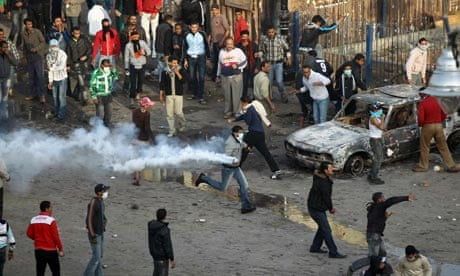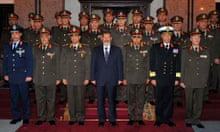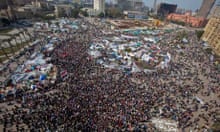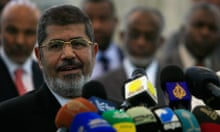Senior interior ministry officials sanctioned the use of live ammunition against protesters in Suez during the opening days of Egypt's revolution, according to a leaked fact-finding report commissioned by the president.
Under the watch of the interior ministry's most senior representative in the region, police fired indiscriminately at crowds from the roof of a police station, according to the report, and senior police officers allowed their deputies to remove weaponry from official stores without presenting identification. The report also describes how a military officer ordered plainclothes police to carry firearms through the streets even after police had been officially evacuated from the city.
These are the latest revelations from a tranche of a report commissioned by the president, Mohamed Morsi, that has been leaked to the Guardian. The new material covers the events of January and early February 2011 in Suez, the first large city to hold major protests against the rule of the then president, Hosni Mubarak.
Earlier leaks documented allegations that the military were involved in torture, killings and forced disappearances during the uprising.
According to the new material, senior interior ministry officials were responsible for the order to use live ammunition to disperse large gatherings, resulting in the deaths of 24 protesters. It claims that high-level officials including Ashraf Abdallah – the ministry's most senior representative in the region – remained in Suez for the opening days of the uprising, and were present in the city as gunmen stationed on the roof of a police station shot "extensively and indiscriminately" into crowds of demonstrators.
Extensive police brutality in Suez has long been alleged by residents and rights campaigners. But the report is significant because it is the first hint of an official state acknowledgment of the crimes. No police officer has ever been jailed for their treatment of protesters, nor has it ever been proved that their behaviour was sanctioned centrally.
"This report is incredibly important because it contains internal orders from the ministry of the interior," said Heba Morayef, Egypt director for Human Rights Watch. "That is incredibly important evidence that hasn't come to light yet. The key question is whether or not police were ordered to arm themselves with live ammunition – and the report concludes that the ministry of interior classified the protest as riots, and that then justified an excessive response on the part of the police."
The chapter documents an "excessive use of force" in densely populated residential areas, with police using tear gas, bird shot and live ammunition. According to one witness, the scene resembled "war in the streets" – and overall the report creates an impression of a chaotic police response that was nevertheless sanctioned by central powers.
In at least one instance, security forces targeted with live rounds citizens standing on balconies as they threw water bottles to the crowds below, testimony compiled by the report alleges. In other evidence, witnesses describe how three noncommissioned officers were joined on the roof of a police station by a chief inspector, and fired machine guns and pistols into the crowds below.
The strength and intensity of the protests in Suez took officials by surprise, and it is where the first deaths of revolutionaries occurred. Fearing the kind of unrest that had swept Tunisia's president from power 10 days before, security officials in Suez issued instructions on 24 January that sanctioned extensive police surveillance and deployments in areas where large crowds could gather.
Police in Suez were the first security officials to kill protesters during the revolution – but none has since been sent to jail. According to the relative of a dead protester who gave testimony to the commission, security officials would later try to avoid culpability by refusing to hand over bodies from the city's mortuary in order to minimise the likelihood that complaints would be filed against them.
Throughout the uprising, armed police in plainclothes roamed the streets of Suez, according to interior ministry documents compiled in the report. In one video seen by the committee, a man identified as a plainclothes police officer is shown firing erratically in the streets. The report claims the practice of disguising armed security personnel in civilian clothes continued even after 29 January when the police were officially evacuated from the city.
The report also alleges that shotguns and other weapons were handed over to police conscripts without IDs. Although security experts could not confirm whether this represents an explicit breach of protocol, they argued that it reflected the chaotic nature of decision-making within police stations as the security services struggled to bring protests under control.
Rights activists hope the leaking of the report will lead to the conviction of the many Suez policemen and officials who remain at large.
"One of the main problems over the past two years has been the difficulty in identifying the perpetrators. In this report, a number of police officers and sub-officers who are not included in current trials are explicitly identified," said Karim Ennarah, a researcher on police and criminal justice at the Egyptian Initiative for Personal Rights. "All should be suspended and, based on the evidence contained in the report, should be prosecuted."
He added: "The findings of the report, based on witness accounts, an inspection of areas surrounding police stations, and a review of the ammunition issue orders and deployment orders, prove excessive use of firearms doesn't even come close to what has been documented in Suez.
"This was nothing short of cold-blooded murder. Police officers identified in the report can be charged for murder, at the very least attempted murder if a direct link cannot be established between weapons used and deaths."
But this week, that did not look likely. One lawyer involved in an ongoing trial of police accused of crimes in Suez during the 2011 uprising – and who was also involved in the drafting of the report – said his findings had not been taken into account by the trial judge. "If the prosecution had done their job, they would have investigated and used it. But I don't think they have done anything," said Mohsen Bahnasy, a human rights lawyer.
The report was presented to the president himself in January, but so far it has not been officially published, creating the impression that Morsi wishes to sweep its damning contents under the carpet.
The presidency told the Guardian on Wednesday that he had not yet read it because it was still be investigated by the prosecutor general. There is a feeling that Morsi wants to avoid angering senior members of the military and police, on whose support the success of his administration depends.
But campaigners stressed it was essential that the report's recommendations were first published officially and then acted on. Any other response, they said, would give the police the green light to continue to behave with impunity.
"This report needs to be made public by the president. It needs to be published so that it can have that official stamp of endorsement," said Morayef. "If we haven't even had a [presidential] condemnation of the repressive response by police during the revolution, then that's what creates this impression that they [still] have absolute discretion."
Egypt's interior ministry did not respond to requests for comment.







